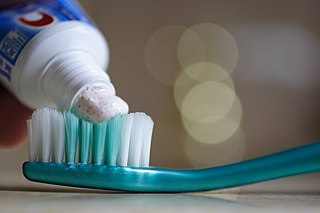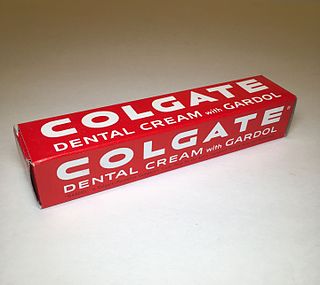Well-known products

Dental care
- blend-a-med
- blend-a-med Formel Z
- Blendax Antibelag [5]
- Blendi [6]
- Formel M
- Strahler 70, Strahler 75 and Strahler 80
- Blendax Fluor Super
Haircare
Skincare
- Kamill [9]
- Credo
- Cliff
- Do7
| Industry | Hygiene products |
|---|---|
| Founded | 1932 in Mainz |
| Parent | Procter & Gamble |
Blendax GmbH, founded in 1932 in Mainz , was a German manufacturer of personal hygiene products and toothpaste between 1936 and 2002. With an annual production of 43 million tubes of toothpaste, it was at one time Europe's largest toothpaste producer.
The company's best known brand, introduced in 1951, [1] was called blend-a-med. [2] Since 1987, the company has belonged to Procter & Gamble. [3]
The wordmark "Blendax" for toothpaste was registered in Germany on 4 January 1910, [4] and the Blendax factory was founded in 1932 by the brothers Rudolf und Hermann Schneider in Mainz; production started in 1936. The goal was to produce a brand of toothpaste that would be affordable by everyone. By the end of the 1930s, Blendax had become Europe's largest producer of toothpaste with 43 million tubes per year. The product portfolio was expanded to include other personal hygiene products like shampoo, soap, skin cream and Mouthwash.
The main and original factory in Mainz on the Ingelheimer Aue (an island in the Rhine) was almost completely destroyed during World War II. The undamaged branch in Gera was appropriated after the war. At first it was known as VEB Blendax, later as VEB Gerana and after German reunification, as Gerana Cosmetic GmbH, before finally being closed in 2007 as a result of bankruptcy. The original buildings in Gera by the city moat are still extant.
The Mainz work was rebuilt in 1946, with toothpaste production resuming in 1949. In 1956, the production was expanded to include shampoo and bath foam. A special toothpaste for milk teeth was introduced in 1956 under the name Blendi, and in 1957 the production of toothbrushes was started. In the 1970s, the toothpaste Strahler 70 was introduced.
In 1949 the Mainz pharmacist Hertha Hafer offered Blendax her original toothpaste recipe, and In 1951 they started production of blend-a-med, Germany's first medicated toothpaste, at first only available from pharmacies and dentists.
As a result of this new product, a research and development division was founded in the same year under the name blend-a-med Forschung, with the goal to develop products for the prevention of dental and oral diseases.

Dental care
Haircare
Skincare
In 1987 the family business was taken over by the American company Procter & Gamble. At first the takeover led to a strengthening of the site, as P&G moved their British toothpaste production to Mainz in 1989, making the site their main European dental hygiene centre. In 1993, however, the production of skincare products in Mainz was stopped. The production of toothpaste and toothbrushes was continued until 2002, when it was moved to the previous Richardson Wicks site in nearby Groß-Gerau.

A toothbrush is an oral hygiene tool used to clean the teeth, gums, and tongue. It consists of a head of tightly clustered bristles, atop of which toothpaste can be applied, mounted on a handle which facilitates the cleaning of hard-to-reach areas of the mouth. They should be used in conjunction with something to clean between the teeth where the bristles of the toothbrush cannot reach - for example floss, tape or interdental brushes.

Toothpaste is a paste or gel dentifrice used with a toothbrush to clean and maintain the aesthetics and health of teeth. Toothpaste is used to promote oral hygiene: it is an abrasive that aids in removing dental plaque and food from the teeth, assists in suppressing halitosis, and delivers active ingredients to help prevent tooth decay and gum disease (gingivitis). Owing to differences in composition and fluoride content, not all toothpastes are equally effective in maintaining oral health. The decline of tooth decay during the 20th century has been attributed to the introduction and regular use of fluoride-containing toothpastes worldwide. Large amounts of swallowed toothpaste can be poisonous. Common colors for toothpaste include white and blue.

Colgate-Palmolive Company is an American multinational consumer products company headquartered on Park Avenue in Midtown Manhattan, New York City. The company specializes in the production, distribution, and provision of household, health care, personal care, and veterinary products.
Crest is an American brand of toothpaste and other oral hygiene products made by American multinational Procter & Gamble (P&G) and sold worldwide. In many countries in Europe, such as Germany, Bulgaria, Serbia, Ukraine, Belarus, Russia, Poland, Hungary, Latvia, Romania, Estonia and Lithuania, it is sold as Blend-A-Med, the name of an established German toothpaste acquired by P&G in 1987. In France, Italy, Israel, Sweden, Finland, Argentina, Belgium, the Netherlands, Brazil, the United Kingdom, the Republic of Ireland, Australia, Nigeria, Greece, Uruguay and Colombia, P&G markets similar toothpaste formulations under the Oral-B brand.
Umbrella branding is a marketing practice involving the use of a single brand name for the sale of two or more related products. Umbrella branding is mainly used by companies with a positive brand equity. All products use the same means of identification and lack additional brand names or symbols etc. This marketing practice differs from brand extension in that umbrella branding involves the marketing of similar products, rather than differentiated products, under one brand name. Hence, umbrella branding may be considered as a type of brand extension. The practice of umbrella branding does not disallow a firm to implement different branding approaches for different product lines.

Sodium monofluorophosphate, commonly abbreviated SMFP, is an inorganic compound with the chemical formula Na2PO3F. Typical for a salt, MFP is odourless, colourless, and water-soluble. This salt is an ingredient in some toothpastes.
Gleem is an American brand of oral hygiene products, including toothpastes and electric toothbrushes, owned by the Procter & Gamble. It was introduced as a toothpaste in the United States in 1952 and discontinued in 2014. Procter & Gamble later revived Gleem toothpaste as a flavor variant of Crest toothpaste. In 2019, Procter & Gamble expanded the brand to include a line of electric toothbrushes.
Ipana was a toothpaste manufactured by Bristol-Myers Company. The wintergreen-flavored toothpaste, with active ingredient 0.243% sodium fluoride, reached its peak market penetration during the 1950s in North America. Marketing of Ipana used a Disney-created mascot named Bucky Beaver in the 1950s.

Colgate is an American brand principally used for oral hygiene products such as toothpastes, toothbrushes, mouthwashes and dental floss. Manufactured by Colgate-Palmolive, Colgate's oral hygiene products were first sold by the company in 1873, sixteen years after the death of the founder, William Colgate. The company originally sold soap.
Personal care products are consumer products which are applied on various external parts of the body such as skin, hair, nails, lips, external genital and anal areas, as well as teeth and mucous membrane of the oral cavity, in order to make them clean, protect them from harmful germs and keep them in good condition. They promote personal hygiene and overall health, well-being and appearance of those body parts. Toiletries form a narrower category of personal care products which are used for basic hygiene and cleanliness as a part of a daily routine. Cosmetic products, in contrast, are used for personal grooming and beautification. Pharmaceutical products are not considered personal care products.

Block Drug Company was a pharmaceutical company based in Jersey City, New Jersey, United States, that specialized in dental care products. Its most popular products included Polident denture cleanser, Poli-Grip denture adhesive, Dentu-Creme denture toothpaste, Nytol sleeping pill, Tegrin medicated shampoo for psoriasis, Lava hand soaps, Beano and Phazyme anti-gas products, Balmex diaper rash ointments, and Sensodyne desensitizing toothpaste.

A toiletry bag is a portable container—usually a pouch with a drawstring or zippered closure—that holds body hygiene and toiletry supplies such as toothbrush and toothpaste, dental floss, cotton swabs, deodorant, nail clippers, tweezers, soap, shaving supplies, hairbrush, contact lenses and feminine products. Toiletry bags are most often used for traveling and in living circumstances where permanent shelves and cupboards are unavailable for use.

Oral-B is an American brand of oral hygiene products, including toothpastes, toothbrushes, electric toothbrushes, and mouthwashes. The brand has been in business since the invention of the Hutson toothbrush in 1950 and in Redwood City, California.

Jordan is a multinational manufacturing corporation based in Oslo, Norway which specializes in dental hygiene and brushes.

Sunstar is a Japanese global oral care, health and beauty, chemicals, indoor air quality and motorcycle parts conglomerate with international affiliates. The corporation has two main wings, healthcare and engineering. The current CEO is Hiroo Kaneda. Its main businesses are the development, manufacturing and sale of oral care products as well as of chemical formulations for industrial applications and motorcycle parts. In recent years it has been expanding into the area of Cosmetics and Health Food.
Reach is an American brand of oral hygiene products, including toothbrushes, dental floss, and mouthwash. The brand originated from Reach toothbrushes developed by DuPont in 1976.
The TRISA Group is a Swiss consumer products company, focused on producing personal hygiene products like oral care, hair care and body care. It was founded in 1887 by six citizens of the municipality of Triengen, in the district of Sursee within the Swiss canton of Lucerne. Trisa employs approximately 1,150 people and generated sales of 232.1 million Swiss francs in 2015. It operates in 80 markets around the world and the company is owned by the fourth generation of Pfenniger family, Andrian Pfenniger and Phillip Pfenniger.